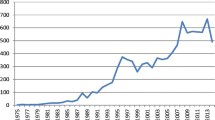Abstract
The paper explores the opportunities and challenges of learning and teaching mathematics in the information era from a Vygotskian perspective. A systemic approach is taken to an investigation of the ways in which information technologies have changed the contexts for and forms of mathematical activity in society and the challenge that this change presents to mathematics educators at all levels.
Similar content being viewed by others
References
Booth, D.: 1984, ‘Aspects of logico-mathematical intuition in the development of young children's spontaneous pattern painting’, in The Proceedings of the Eighth Annual Conference for the Psychology of mathematics Education, Australia, Sidney, 224–232
Brousseau, G.: 1992, ‘Didactique: What it can do for the teacher’, in: R. Douady and A. Mercier (Eds.), Research in Didactique of Mathematics, La Pensée Sauvage, Paris, 7–39.
Crawford, K.P.: 1986a, ‘Simultaneous and successive processing, executive control and social experience: Individual differences in educational achievement and problem solving in mathematics’, An unpublished thesis submitted in fulfilment of the requirements of a degree of Doctor of Philosophy at the University of New England, Armidale, NSW, Australia.
Crawford K.P.: 1986b, ‘Cognitive and social factors in problem solving behaviour’, in The Proceedings of the Tenth Conference of the International Group for the Psychology of Mathematics Education, London, July, pp 415–421.
Crawford, K.P.: 1988, ‘New contexts for learning mathematics’, in The Proceedings of the 11th Annual Conference of the International Group for the Psychology in Mathematics Education, Vesprem, Hungary, August. 239–246.
Crawford, K.P.: 1992a, ‘Applying theory in teacher education: Changing practice in mathematics education’, in W Geeslin and K Graham (Eds.), The Proceedings of the Sixteenth Annual Conference of the International Group for the Psychology of Mathematics Education, University of New Hampshire, Durham, NH, 161–7.
Crawford, K.P.: 1992b, ‘Playing with Lego/Logo: School definitions of work and their influence on learning behaviour’, in L Nevile (Ed.) Proceedings of the Logo and Mathematics Education Conference, LME5 Lake Tineroo, Queensland Australia, April 1991, 45–55.
Crawford, K.P.: in press, ‘Designing, exploring and interacting: Novice activities in the Boxer computational medium.’ To appear in A. DiSessa and C. Hoyles (Eds.) Computerbased Exploratory Environments in Mathematics and Science, Springer Verlag.
Crawford, K.P., Gordon, S., Nicholas, J., and Prosser M.: 1993, ‘Learning mathematics at university level’, in W. Atweh (Ed.), Contexts in Mathematics, The Proceedings of the Mathematics Education Research Group of Australasia, Annual Conference, Brisbane July 1993, 209–214.
Crawford, K., Groundwater-Smith, S., and Milan, M.: 1990, Gender and the Evolution of Computer Literacy, a revised research report to the N.S.W Ministry of Education, Canberra, Government Printing Office.
Davidov, V. and Radzikhovskii: 1985, ‘Vygotsky's theory and the activity-oriented approach in psychology’, in J. Wertsch (Ed.) Culture Communication and Cognition: Vygotskian Perspectives, Cambridge University Press, NY, pp. 35–66.
Davydov, V.V., Zinchenko, V.P. and Talysina, N.F.: 1983, ‘The problem of activity in the works of A.N. Leont'ev (1)’, Soviet Psychology, Summer 21(4), pp. 31–43.
Eiser, J.: 1994, Attitudes, Chaos and the Connectionist Mind, Cambridge Ma., Blackwell.
Foravsky, D.: 1991, Russian Psychology, UK, Blackwell.
Fugita, H.: 1993, ‘Principles in organising university and pre-university mathematics curricula for scientists and engineers’, a paper presented at the South East Asian Congress on Mathematics Education, June 7–11, Surabaya, Indonesia.
Kozulin, A.: 1991, Vygotsky's Psychology, MIT Press, Cambridge Ma.
Lave, J.: 1988, Cognition in Practice, Cambridge University Press, Cambridge.
Lave, J. and Wenger, E.: 1990, Situated Learning: Legitimate Peripheral Participation, Research Report No. IRL90–0013, Institute for Research on Learning, Palo Alto.
Luria, A.R.: 1973, The Working Brain, Penguin, UK.
Newman, F. and Holzman, L.: 1993, Lev Vygotsky, Routledge, London.
Newman, D., Griffin, P., and Cole, M.: 1989, The Construction Zone: Working for Cognitive Changes in Schools, Cambridge University Press, Cambridge.
Papert, S.: 1994, The Children's Machine: Rethinking School in the Age of the Computer, Harvester/Wheatsheaf, UK.
Semenov, I.N.: 1978, ‘An empirical psychological study of thought processes in creative problem solving from the perspective of the theory of activity’, Soviet Psychology, 16(1), pp. 3–46.
Speedy, G.: 1989, ‘Chair, the discipline review of teacher education in mathematics and science’, Government Printing Office, Canberra.
Stenberg, R.: 1985, ‘Components of human intelligence’, Cognition, 15(1) pp. 1–48.
Van der, Veer, J., and Valsiner, I.: 1991, Understanding Vygotsky: A Quest for Synthesis, Oxford University Press, UK.
Vygotsky, L.S.: 1962, Thought and Language, MIT Press, Cambridge Ma.
Vygotsky, L.S.: 1978, Mind in Society, (Cole, M., Scribner S., John-Steiner V., and Souberman, E., Trans.) Harvard University Press, Cambridge Ma.
Vygotsky, L.S.: 1986, Thought and Language, (Newly revised-translated and edited by A. Kozulin) MIT Press, Cambridge Ma.
Walkerdine, V.: 1988, The Mastery of Reason, London, Routledge.
Wertsch, J.: 1981 (Ed.), The Concept of Activity in Soviet Psychology, M.E. Sharpe, U.S.
Wertsch, J.: 1985, Culture Communication and Cognition: Vygotskian Perspectives, Cambridge University Press, NY.
Wertsch, J.: 1986, Vygotsky and the Social Formation of the Mind, Harvard University Press, Cambridge,Ma.
Author information
Authors and Affiliations
Rights and permissions
About this article
Cite this article
Crawford, K. Vygotskian approaches in human development in the information era. Educ Stud Math 31, 43–62 (1996). https://doi.org/10.1007/BF00143926
Issue Date:
DOI: https://doi.org/10.1007/BF00143926




